Yunus in London: Who bears responsibility for the diplomatic misstep?
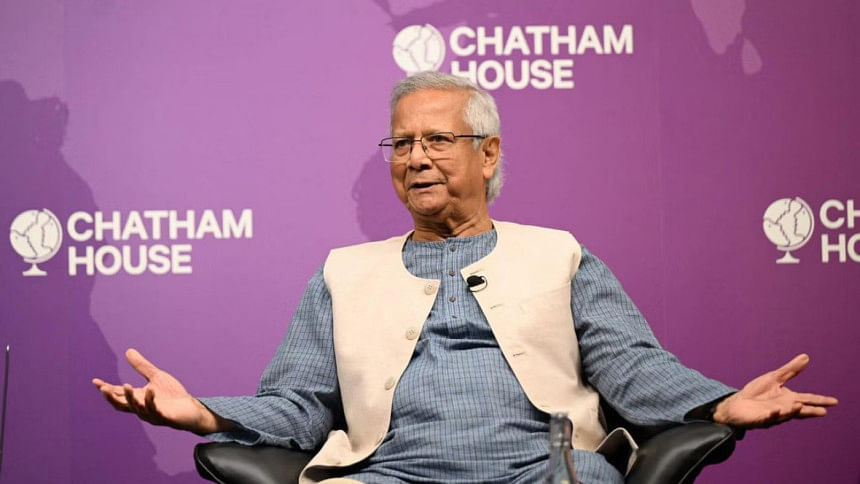
When the BBC's Rajini Vaidyanathan asked Professor Muhammad Yunus—head of Bangladesh's interim government—during his recent visit to London why he was meeting the king but not the prime minister, it was an awkward moment for most. Yet, without hesitation or irritation, as clearly heard on the radio, Professor Yunus replied: "Well, we would be very happy to meet him. Somehow, probably he is busy or whatever. But that gives me a great opportunity too—now that he is busy, I invite him to come to Bangladesh." A witty remark, no doubt, though hardly a satisfying explanation.
Rajini followed up with a more pointed question: "What reason does Downing Street give you for not arranging the meeting?" To this, Professor Yunus replied: "I don't think we've received any explanation. Probably he is busy with other important things." This exchange highlighted the foreign ministry's failure to secure a key meeting during the chief adviser's visit to a country with which Bangladesh shares a special and historic relationship.
Bangladesh's ties with the UK extend beyond bilateral trade, finance, and its large diaspora; they are also rooted in colonial history. High-level political visits are not merely symbolic—they serve as essential diplomatic engagements. Planning such visits requires meticulous attention to detail: scheduling meetings, setting agendas, and managing protocol and cultural briefings. According to the British Foreign, Commonwealth and Development Office, preparations for a full state visit can take up to four years due to their complexity—though this was not a state visit but an official one.
Criticism of the interim government for this diplomatic lapse is not mere politicking. Rather, it reflects genuine concern over a missed opportunity to strengthen vital international relationships. Acting Foreign Secretary Md Ruhul Alam Siddique acknowledged this on Tuesday, stating the ministry bore some responsibility for the failure to arrange a meeting between Chief Adviser Yunus and British Prime Minister Keir Starmer. Responding to a journalist's question, Siddique said: "As it was our responsibility to organise the visit, we are to some extent responsible for the meeting not taking place, as was announced on our side at the beginning of his visit to the UK," according to a report by daily New Age.
However, this half-hearted admission leaves key questions unanswered. Was a meeting with the British prime minister ever confirmed or formally requested with an agenda? Was it expected to happen informally? Was the Bangladeshi side aware that Prime Minister Starmer would be occupied with the critical spending review in parliament—a period of intense political activity? Whoever within the foreign ministry approved the upgrade of this trip to an official visit without securing proper appointments must be held accountable for this national embarrassment.
Even more perplexing was the absence of the foreign adviser during the visit—a departure from long-standing protocol, especially during visits to P5 nations (the five permanent members of the UN Security Council). Neither the permanent foreign secretary nor even the acting foreign secretary was part of the delegation. Organising such a high-level visit without senior diplomatic officials was, arguably, a reckless move.
In her interview, Rajini also sought a comment from the chief adviser on MP Tulip Siddiq's reported request for a meeting to clear her name of corruption allegations that cost her ministerial post, which she described as a "politically motivated smear campaign." Professor Yunus declined to comment, citing the sub judice nature of the matter and the need to avoid interfering in the judicial process. Yet, in contrast, his interview with the Financial Times took a decidedly political tone, with the headline reading: "Keir Starmer declines to meet Bangladesh leader tracking down missing billions." In it, Yunus argued that the UK should feel "morally" obligated to support the recovery of funds allegedly siphoned off during Sheikh Hasina's tenure.
There is no doubt that Professor Muhammad Yunus, a Nobel Peace Prize laureate, draws international attention wherever he goes. His London visit—to receive the King Charles III Harmony Award and to meet the king in a private audience—would likely have occurred even if he were not currently serving as head of the interim government. The foreign ministry, therefore, should not be credited for his wider engagements in London with politicians, business leaders, academics, and leading diaspora figures. Instead, it requires urgent reform to instil professionalism, leadership, and accountability.
While the visit may not have yielded substantial diplomatic achievements, it was politically significant on the domestic front. It helped clarify the interim government's position on a roadmap for restoring democratic governance through elections.
The political uncertainty surrounding this roadmap has been a persistent obstacle to the effective functioning of the non-partisan interim administration. Recently, this ambiguity had become a growing concern. In this context, the much-anticipated meeting in London between Professor Yunus and BNP Acting Chairman Tarique Rahman—long exiled—offered a rare and encouraging signal. Their reported agreement on moving forward with election plans was a welcome development for those seeking a peaceful political transition.
Kamal Ahmed is head of the Media Reform Commission in Bangladesh and an independent journalist. His X handle is @ahmedka1.
Views expressed in this article are the author's own.
Follow The Daily Star Opinion on Facebook for the latest opinions, commentaries and analyses by experts and professionals. To contribute your article or letter to The Daily Star Opinion, see our guidelines for submission.

 For all latest news, follow The Daily Star's Google News channel.
For all latest news, follow The Daily Star's Google News channel. 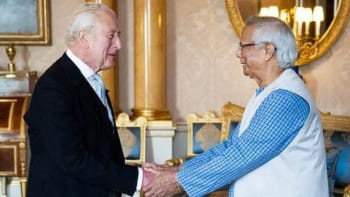
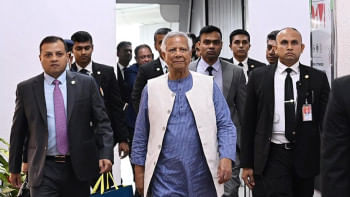


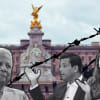


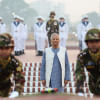



Comments